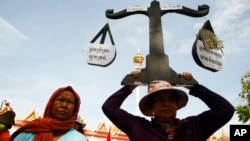Rights and democracy groups say Cambodians are not being protected by the constitution, which has been routinely violated by all three branches of government.
Most recently, a series of laws was passed that gives much control over the judiciary to the executive branch’s Ministry of Justice, in a court system that was already widely seen as biased and corrupt.
Meanwhile, the rights of assembly and free speech are routinely ignored, as police and other forces crack down on demonstrations, activists are jailed, and critics of the government are silenced.
Am Sam Ath, lead investigator for the rights group Licadho, said the constitution also provides for the right to land ownership for Cambodian citizens, but that is not happening, either. “We’ve seen that some citizens suffered from evictions, and others are arrested or imprisoned,” he said.
Over 170,000 families across the country were hurt by land disputes in 2014, according to a new a report by NGO Forum. A third of those came from land concessions, many of which themselves are not legal, in that they exceed a 10,000-hectare limit, Am Sam Ath said.
Such land disputes have created much disagreement between the ruling Cambodian People’s Party, whose supporters tend to benefit from the land deals, and the opposition Cambodia National Rescue Party, which is seeking to prevent people from losing their land.
Prime Minister Hun Sen, in a public speech last week, said the opposition is making promises that hurt successful business owners, warning: “They will confiscate hotels for the poor!” He warned that “discrimination” against the rich could lead to war.
Meanwhile, Rescue Party President Sam Rainsy has promised supporters that the party will seek to collect land from companies if that land has been seized illegally under a concession.
Ou Virak, head of the think tank Future Forum, said that while Cambodia’s constitution is meant to protect people’s land, neither party seems intent on thoroughly respecting the constitution.
“Because of this, we see issues related to land violation, freedom of mobilization, and other issues were rarely mentioned by these people, meaning they will have obligations to protect the interest and the rights of the people if they mention constitution,” he said.







